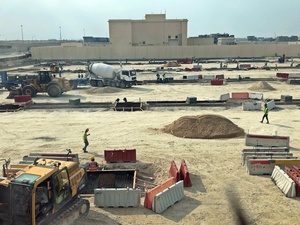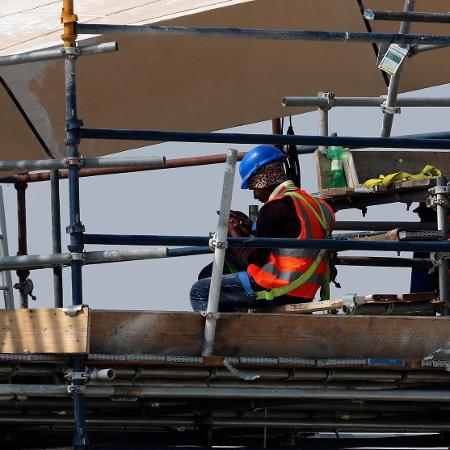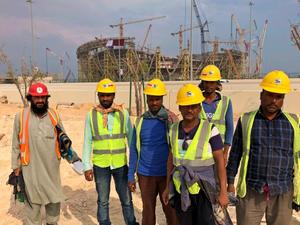Is there slavery in Qatar? Country receives complaints – The Goa Spotlight
Modern stadiums, hundreds of large mirrored buildings, modern infrastructure throughout the cities, Qatar seems like a futuristic dream. But the new structures built to host the 2022 World Cup carry a somber imprint.
A report by the British newspaper The Guardian revealed that 6,500 workers have died since the Asian country received the right to host the event in 2010. The government disputes this number.
Official data state that 40 workers who worked on the construction of the World Cup stadiums have died since the beginning of the works. Of these, only three would have died due to work.

Who are the World Cup workers in Qatar?
Most of the construction workers in the Cup country include people from India, Pakistan, Bangladesh, Nepal, Sri Lanka, Philippines and Kenya. Together, immigrants from these countries total 1.3 million people.
However, overall, more than 80% of Qatar's population of 2.8 million are foreigners.
What is known about the work of immigrants in Qatar?
Denunciations by international entities, such as Amnesty International, speak of various labor violations such as problems with worker safety, exhausting hours in temperatures that can exceed 50°C in summer, precarious housing, salary arrears and, above all, kafala.
Kafala is a system that prohibits foreign workers from changing jobs without the authorization of their current employer. In recent years, Qatar has officially abolished kafala, but Amnesty International says the system continues to be used.
Civil construction workers in the World Cup country interviewed by UOL revealed that they had suffered threats from their bosses when they asked to change jobs.
But what is modern slavery?
You can call it modern slave labor, analogous slave labor or contemporary slave labor, but they all refer to the same thing. The worker is in a situation of restriction of freedom, or is in degrading working conditions, or is working exhausting hours, or is in a situation of debt bondage, or all of these together.
What defines a worker placed in a slave situation:
Forced labour: when there is a restriction on the right to leave the employer
Debt bondage: which is forcing someone to fraudulently acquire a debt and arresting the person for it
Degrading working conditions: it is a job that denies human dignity, putting the health, safety and life of the person at risk
Exhausting journey: means taking the worker to complete exhaustion given the intensity of work, exploitation, which also puts his health and life at risk
How to identify modern slave labor?
At least in Brazil, you, as an ordinary citizen, cannot identify whether or not a worker is in a situation of modern slavery. Those who identify slavery in the country are labor inspectors, labor attorneys, federal, civil and military police, public defenders of the Union and attorneys of the republic.
So what about migrant workers in Qatar is modern day slavery?

For Ambet Yulson, secretary general of the International Construction and Wood Workers (ICM), yes. President of an international workers' union, he has participated in 25 inspections in Qatar since 2017.
“Many people go to Qatar, pay recruitment fees, arrive there and don't receive a salary. I've seen hundreds of cases of workers who didn't get paid for two years. What are they going to eat?”, said Yulson in an interview with UOL Esporte. “This is a case that goes against the international convention on forced labor. This is modern day slavery.”
What can be done now to change this scenario?
In May of this year, Amnesty International asked FIFA to pay compensation of at least US$440 million to foreign workers who experienced labor violations in Qatar.
In addition, several European countries and national teams will protest and boycott the World Cup in the Asian country. According to UOL columnist Jamil Chade, Hummel, the supplier of sporting goods, said that the Danish national team will wear T-shirts in allusion to human rights violations in the Asian country.

Boycotts are often used to pressure companies economically, and there are records of many successful cases. Non-governmental organizations' reports of labor violations in Qatar, for example, have prompted the country to institute at least some changes such as the implementation of a minimum wage.
This “Eyes on Trafficking” story is reprinted from its original online location.
 ABOUT PBJ LEARNING
ABOUT PBJ LEARNING
PBJ Learning is a leading provider of online human trafficking training, focusing on awareness and prevention education. Their interactive Human Trafficking Essentials online course is used worldwide to educate professionals and individuals how to recognize human trafficking and how to respond to potential victims. Learn on any web browser (even your mobile phone) at any time.
More stories like this can be found in your PBJ Learning Knowledge Vault.
EYES ON TRAFFICKING
This “Eyes on Trafficking” story is reprinted from its original online location.
ABOUT PBJ LEARNING
PBJ Learning is a leading provider of online human trafficking training, focusing on awareness and prevention education. Their interactive Human Trafficking Essentials online course is used worldwide to educate professionals and individuals how to recognize human trafficking and how to respond to potential victims. Learn on any web browser (even your mobile phone) at any time.
More stories like this can be found in your PBJ Learning Knowledge Vault.
